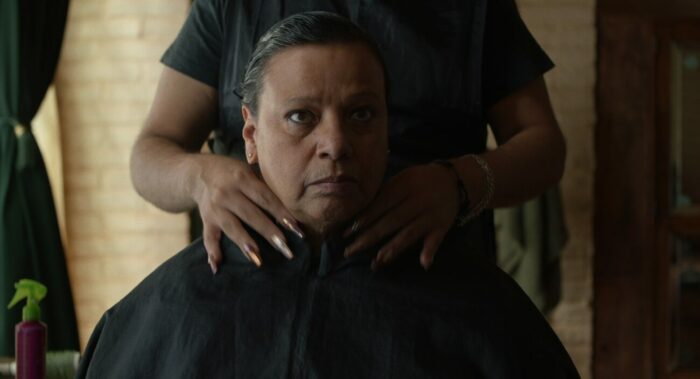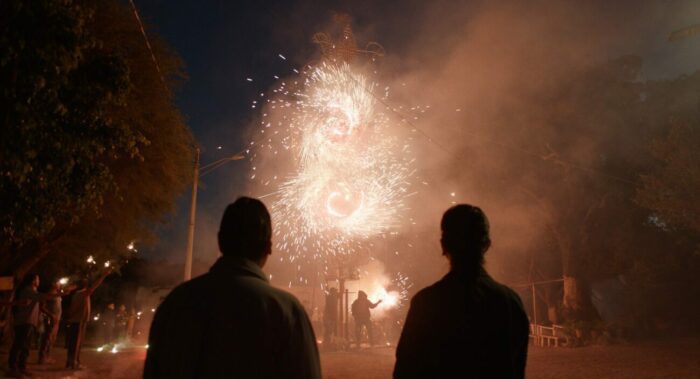Tequila is big, big business. You know that when celebrity entrepreneurs like Kendall Jenner, Nick Jonas, Mark Wahlberg, and The Rock start to poach its potential with their own designer brands. It’s now a $10 billion-dollar industry. Meanwhile, the families who’ve been crafting their own tequila from agave grown in the highlands of Jalisco, Mexico for generations have struggled. Those struggles are documented with incomparable cinematography and mesmerizing performances in Juan Pablo Gonzalez’s sobering Dos Estaciones, winner of a Special Jury Prize at Sundance and now starting a limited theatrical run.
María García (Teresa Sánchez) is the owner of Dos Estaciones, the last holdover from generations of Mexican-owned tequila distilleries in Jalisco. Every other plant there has folded to foreign corporations, and Dos Estaciones appears to face a similar fate. As matriarch of the family-run plant, the stone-faced, iron-willed María, once one of the wealthiest people in town, faces an untenable financial future.

New hire Rafaela (Rafaela Fuentes, one of several non-professional actors cast in the film) comes aboard to help manage the factory, and she and María forge an intimate bond in an industry run by men. But María’s knowledge goes back generations, and Rafaela is a relative newcomer with a great deal to learn. The plant’s labor force, meanwhile, seems to realize the writing on the wall: that the family business is unlikely to weather the financial storm ahead. Worse, long droughts, ravaging insects, and later, an unexpected flood force María into rash decisions to keep her business afloat.
The work of the men and women at Dos Estaciones is presented with deliberate, impeccable cinematography by Gerardo Guerra. Both in the fields and at the plant, Guerra’s patient, cautious camera captures the methodical labor of tequila-making, from harvesting agave to distilling spirits to bottling and labeling, all of these patiently performed by hand, with care and expertise. Guerra captures the highlands of Jalisco with imaginative compositions that convey the region’s remarkable natural beauty, while close-ups of the veteran actor Sánchez trace each crease in a brow furrowed by perpetual worry.

Gonzalez and Guerra’s approach to storytelling is primarily visual, and Dos Estaciones is all the more impactful for its impeccable cinematography. In one scene, a modest fireworks display fades slowly into a dim glow of sparkling ember extinguishing in inky blackness, a metaphor for the tequila plant’s fading vitality. It’s a slow-burn approach, minimalist in narrative exposition while providing a sumptuous visual feast for the eyes. Intimate moments, such as those between María and Rafaela, are shot through narrow doorways in a manner reminiscent of Sirk or Fassbinder. The film is more interested in documenting the experience of its characters and the features of its setting than it is in explaining each specific business transaction or personal decision.
Even so, the film’s primary characters are each richly drawn. María exudes gravitas but faces the near-certain collapse of her family business. Her persona—strong, dignified, taciturn, even unyielding—has fostered her survival in a male-dominated business world, but it complicates her budding relationship with the younger Rafaela. (Sanchez’s performance is a stark contrast to her chatty, charismatic housekeeper in The Chambermaid). Her personal feelings, especially those for Rafaela, remain oblique. Rafaela is expert in the industry but not family; attractive, perhaps for what she represents, but tantalizingly unavailable. Meanwhile, local hairdresser Tatín (Tatín Vera), an openly transgender woman, is finding success with her expanding salon and personal life both, in a stark contrast to María’s plight. (The film also won Grand Jury Prize for Outstanding Screenwriting at Outfest Los Angeles LGBTQ+ Film Festival.)
Dos Estaciones is not the type of film to present melodramatic villains. In fact, no such character ever really appears on camera. María is aware of the forces that threaten to buy up her plant, and even while her financial woes persist, she resists every opportunity to sell. The real-life distillery depicted in the film, run by director Gonzalez’s immediate family, enjoyed a boom that would, like the fictional Dos Estaciones plant, ultimately threaten its own makers’ livelihood. Those small artisanal craft distilleries were the very ones that attracted the attention of international celebrity-vulture entrepreneurs. In the wake of NAFTA, rural lands like Jalisco, where nearly all tequila is manufactured, were eventually overtaken by those exploiting the boom to increase profits via global exports without maintaining sustainable practices or generational ties. The virtual emptying of rural lands and boom of tequila demands led large corporations to develop operations that did not maintain regional cultivation practices or cultural sensitivities. Those are the antagonistic forces María and her family-owned distillery face.
Dos Estaciones, Gonzalez’s first fiction feature, presents a documentary truth of those exploited by the neo-colonialist practices of those north of the border. And at the same time, it tells a compelling story of a proud businesswoman whose company’s name will prove prophetic. Its protagonist, María, will inhabit, indeed, two stations in her life: one as the head of a thriving tequila plant, the other to be determined.
Dos Estaciones opens September 9 at the IFC Center in New York City and September 16 at American Cinematheque in Los Angeles, followed by other cities including Chicago, San Diego, and Seattle.



